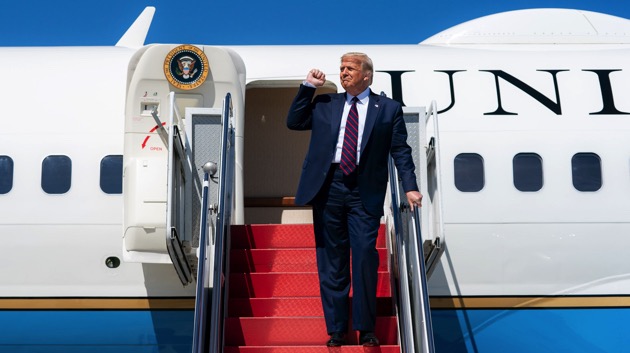
Official White House Photo by Tia DufourBy JORDYN PHELPS and BEN GITTLESON, ABC News
(WASHINGTON) — President Donald Trump on Monday planned to move forward with a visit to Kenosha, Wisconsin, on Tuesday in what the White House said would be a “unifying” visit, even as the state’s governor has asked the president to reconsider and his Democratic opponent Joe Biden has accused him of “fanning the flames of hate and division in our society.”
The president’s visit comes against the backdrop of heightened tensions and a week of protests after a White police officer shot a Black man, Jacob Blake, in the back seven times last weekend, leaving him partially paralyzed.
“He loves the people of Wisconsin and he looks forward to speaking directly to them and unifying the state,” White House press secretary Kayleigh McEnany said in an interview on “Fox and Friends” Monday.
She mocked the idea of Biden delivering a speech in Pittsburgh, Pennsylvania, on Monday to respond to the unrest in Wisconsin and elsewhere, saying that Trump by contrast “shows up” and is “demonstrating his respect for the American people by actually going to places where Americans are hurting.”
But Wisconsin’s Gov. Tony Evers, a Democrat, does not see the president’s visit as helpful and wrote to the president Sunday to say, “I am concerned your presence will only hinder our healing.”
In his letter, Evers expressed concern that a visit from the president would redirect resources from the city’s recovery “at a time when it is critical that we continue to remain focused on keeping the people of Kenosha safe and supporting the community’s response.”
While the state’s Democratic governor does not welcome the president’s visit, seven conservative-leaning members of the 23-member Kenosha County Board, which represents the area around the city, wrote a separate letter encouraging Trump to visit.
“Please do not cancel your plans to visit Kenosha to meet with citizens and business owners devastated by the violence that took place this past week,” the letter reads. “Kenoshans are hurting and looking for leadership, and your leadership in this time of crisis is greatly appreciated by those devastated by the violence in Kenosha.”
McEnany said the current plan was for the president to meet with law enforcement and tour “some of the damage from the riots” while in Kenosha.
Protesters have marched daily for over a week since Blake’s shooting, demanding racial justice and opposing police brutality. Some gatherings have led to damage to property, and on Tuesday, police say, an Illinois teenager opened fire during demonstrations and killed two protesters.
It remained an open question Monday whether the president may meet with Blake’s family. Asked about the possibility, McEnany said the White House is “efforting outreach” to the family but has “not been able to connect yet.”
White House Chief of Staff Mark Meadows told reporters Friday he had spoken to a pastor connected to the family but had not been able to talk with any of Blake’s relatives.
“Our family don’t particularly want to have anything to do with him,” Blake’s uncle, Justin Blake, told ABC News in an interview Sunday. “We believe he incited this violence.”
The president remained silent of Blake’s shooting for days following the incident, only breaking his silence Friday in an interview with ABC television affiliate WMUR, saying, “It was not a good sight, I didn’t like the sight of it certainly and most people would agree with that.”
Teasing his upcoming trip on Twitter, the president on Monday said, “I will see you Tuesday!” and made a misleading claim in taking credit for sending in the National Guard paired with another outlandish claim that “there would be no Kenosha right now” otherwise.
If I didn’t INSIST on having the National Guard activate and go into Kenosha, Wisconsin, there would be no Kenosha right now. Also, there would have been great death and injury. I want to thank Law Enforcement and the National Guard. I will see you on Tuesday!
— Donald J. Trump (@realDonaldTrump) August 31, 2020
But it was the Wisconsin governor — not the president — who activated the National Guard. The president does not have the authority to simply dispatch the National Guard at his will, as he implies in the tweet and has previously claimed.
While the president could seek to invoke the Insurrection Act to dispatch active duty federal forces domestically under extraordinary circumstances, the president has not done so.
But at a campaign rally on Friday, however, Trump said, “we’re going to have to look at” possibly using the Insurrection Act going forward as he sought to frame his reelection campaign in terms of a mission to “save democracy from the mob.”
The president threatened to invoke the act during nationwide, largely peaceful protests in June, but ultimately never did.
Copyright © 2020, ABC Audio. All rights reserved.
